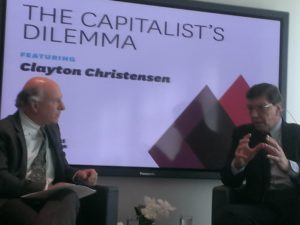My Conversation with Clayton Christensen on Business Metrics Mis-use
I was invited to a Harvard Business Review live-streamed seminar with Clayton Christensen, PhD on June 26, 2014. I selected an excerpt about Clayton’s view that business leaders must discard short term business metrics and go back to thinking long term to innovate successfully.

Thank you to the late Clayton Christensen, PhD for his world renowned insights on innovation and his impact on business. (April 6, 1952-January 23, 2020)
_____________________________________________________
Clayton’s Impact on the World, and Me
Clayton M. Christensen, PhD., was a Professor of Business Administration at the Harvard Business School and a best-selling Author. He was renowned as a intellect who advised many world political and business leaders and who shaped our current view of innovation and its influence. The event was facilitated by Adi Ignatius, Harvard Business Review Editor-in-Chief.
Clayton had a profound impact on the way I advise CEOs and their management teams to develop and execute strategies. In particular, Clayton’s theories are germane to Anticipatory Organizations. I apply his insights to assessing strategies for their short term and long term business impact.
Mis-used Metrics
Clayton spoke about his pillars of innovation and how they impact economic well-being. A key thrust of his discussion was how business leaders across the world have shifted their focus to short term gain. They are now using performance metrics based on speed instead of long term gain.
I had a chance to speak directly with Clayton at the end of the discussion. Here is my transcript of our conversation. I also provide links to my position papers that were sparked by this encounter.
My Question, Clayton’s Solution
As the Q&A part of the seminar began I raised my hand and was acknowledged. Following earlier instructions, I waited for the microphone to arrive. While I was waiting Clayton looked at me, sitting directly in front of him in the front row.
Clayton smiled and said, “Doug, I hope you not going to ask a hard question”. I gave him a nod and wry smile. “Sorry, it will be….”, I said sarcastically. He smiled again and leaned back in his chair…
“Clayton, I am Doug Reed of FosterGrowth. Earlier in this discussion you identified that business managers are conditioned to think short term, even though the cost of capital is low and companies are hoarding cash. My question is, should interest rates stay long indefinitely, say 10 to 20 years, might the behavior you describe revert back to the healthy long term behaviors you said once existed? Thus, solving the problem.
[Doug] “I attended a meeting and heard a presentation by Martin Regalia of the U.S. Chamber of Commerce and he felt that there would be continued pressure on the feds to keep rates low because our huge debt is now linked to low rates. The debt would explode to catastrophic levels if rates were allowed to rise. Thus, I thought that perhaps rates might stay low for a very long time.”
Clayton’s response: “I had not thought about that. Give me a moment to consider that.” Pause..
Clayton continued: “It may be that interest rates stay low for a long time, thus making it more obvious that there is low risk is making long term investments. [However], the persons who are running our businesses got there because they are good at making the current metrics work. Even though they are the wrong metrics, those persons who are conditioned and good at working with them got to their position by following them.”
[Clayton] “The persons who used to run our businesses and who were good at the long term metrics and achieving Marketing Creating Innovations, are no longer around. Thus, it may be that the wrong metrics will continue to be followed until new persons take charge of our businesses and they embrace the right metrics.
The Punch Line
Then came a follow-up question from the web audience: “If that is true, that it will take future leaders that have the right values, is it not the responsibility of our educational institutions to teach this?”
[Clayton] “Yes, so perhaps all universities should adopt my class curriculum.” Laughter….
Resources for You
To learn more on the seminar’s subject, read this article published in the June 2014 Harvard Business Review. http://hbr.org/2014/06/the-capitalists-dilemma/ar/1
Since that seminar I have promoted Clayton’s views and innovation definitions through dozens of conference presentations, webinars and articles. The following list contains links to those articles.
December 2018 PE Magazine: Leverage Disruptive Technology
Growth and Strategy Development: Danger! Technology Disruption
